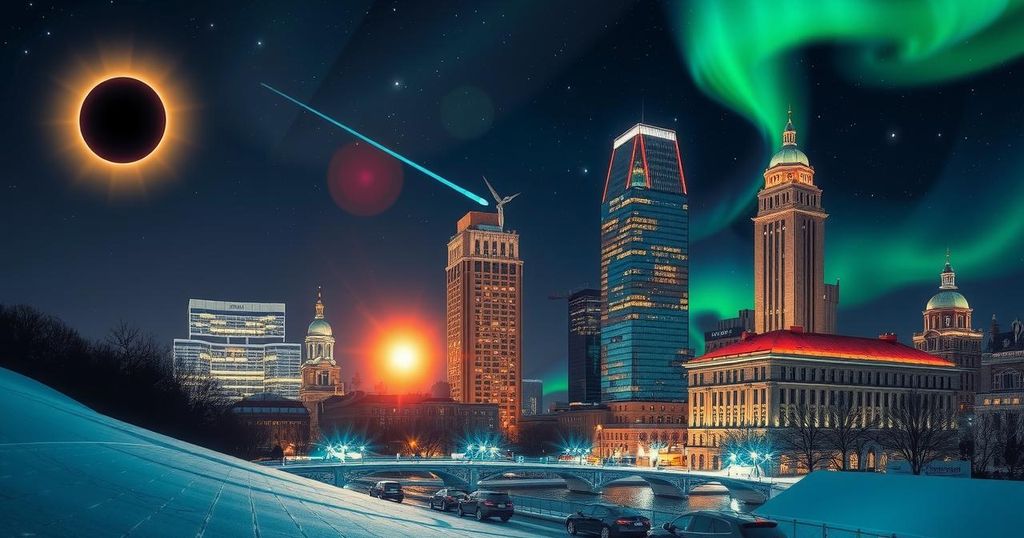Remarkable Weather Events of 2024 in Philadelphia

The year 2024 in Philadelphia brought unprecedented weather phenomena including a significant earthquake, multiple instances of the northern lights, and the warmest temperatures on record. January was notably wet, followed by an unusual eclipse in April. The summer experienced high temperatures and tornado activity, while October saw a historic drought. Overall, it was marked by unusual climatic extremes not commonly observed in the region, prompting future considerations for weather forecasting.
In 2024, Philadelphia experienced an array of unusual weather events, including earthquakes, eclipses, and even sightings of the northern lights. The year commenced with an exceptionally wet January, marking it as the fourth wettest on record, followed by a mild February with minimal snowfall. March ranked as the ninth warmest with significant rainfall, leading to some record-breaking temperatures.
The spring brought an unexpected earthquake, measuring 4.8, affecting a wide area from New England to Virginia, and was succeeded by a notable eclipse, which partially obscured the sun. The increasing warmth was evident as the month concluded with temperatures soaring into the 90s.
In May, the northern lights graced the skies of the Lehigh Valley, attributable to increased solar activity. The summer months brought numerous hot days, culminating in July’s 14 days of 90-degree weather, while August recorded flash floods and tornado activity, marking a stark contrast from previous years.
September saw a much drier trend, followed by October, which became the driest on record, exacerbating wildfire risks. However, the month also provided another chance to witness the northern lights and a comet, capturing the public’s fascination. November’s warmth was notable for highs reaching the 80s, leading into a much colder conclusion to the year, ending with December as the warmest month recorded in Philadelphia’s history.
The data suggests a correlation between warm, dry autumns and below-average winter snowfall, indicating an ongoing trend for the Philadelphia region. As 2025 approaches, forecasts predict continued opportunities for the northern lights, attributable to the sun’s active phase.
In the context of climate variability and shifting weather patterns, the year 2024 has been particularly distinctive for Philadelphia. From significant precipitation events in the early months to the emergence of unusual seismic and astronomical occurrences, the region saw a blend of phenomena that are rare in its historical weather profile. Notably, the northern lights’ visibility, typically constrained by geographic limitations, was enhanced during periods of heightened solar activity, providing an extraordinary experience for local observers. Such climatic patterns warrant further analysis as they may indicate larger trends influenced by global climate change.
2024 has proven to be a remarkable year for Philadelphia, characterized by extreme weather variations, including an earthquake, a significant eclipse, and multiple northern lights sightings. The combination of wet winters, warm summers, and the driest October on record highlight a significant departure from typical weather patterns and provide crucial data for future forecasts. As we move into 2025, the ongoing active phase of solar activity may present additional opportunities for the public to witness the northern lights, maintaining engagement with the natural phenomena that enrich our understanding of the universe.
Original Source: www.fox29.com







